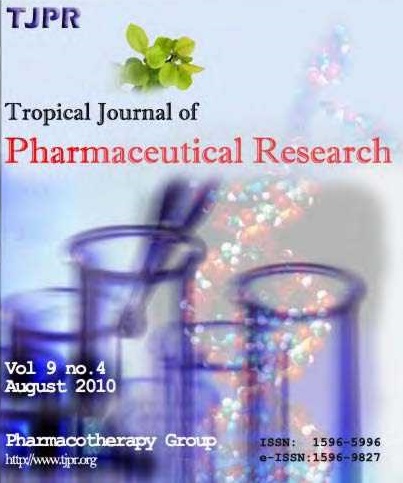右美托咪定预处理通过AMPK通路抑制大鼠心肌缺血再灌注损伤中的ROS
IF 0.6
4区 医学
Q4 PHARMACOLOGY & PHARMACY
引用次数: 0
摘要
目的:探讨右美托咪定预处理对ros诱导的大鼠心肌缺血再灌注损伤(IRI)心脏保护作用的基础。方法:将SD大鼠60只分为假手术组、模型组和右美托咪定干预组,每组20只。模型组和右美托咪定干预组采用改良缝线法诱导心肌IRI。假手术组大鼠开胸不结扎,右美托咪定干预组在IRI模型建立前给予右美托咪定(5 μg/kg)预处理。Western blot检测腺苷5′-单磷酸腺苷(AMP)活化蛋白激酶(AMPK)的蛋白表达。采用流式细胞术检测ROS的平均荧光强度。结果:AMPK蛋白在模型大鼠中相对于假手术大鼠显著下调,但在右美托咪定干预大鼠中显著升高(p <0.05)。模型大鼠心肌细胞ROS荧光平均强度和凋亡程度均高于假手术大鼠(p <0.05),右美托咪定干预组较低。结论:右美托咪定通过激活AMPK通路,抑制线粒体ROS生成,降低心肌组织氧化应激,发挥保护作用。因此,该化合物可能在IRI的治疗中具有潜在的临床作用。本文章由计算机程序翻译,如有差异,请以英文原文为准。
Dexmedetomidine pre-conditioning induces inhibition of ROS in myocardial ischemia-reperfusion injury in rats through AMPK pathway
Purpose: To elucidate the basis for the cardioprotective effect of dexmedetomidine pre-treatment on ROS-induced myocardial ischemia-reperfusion injury (IRI) in rats.Methods: Sixty Sprague-Dawley (SD) rats were assigned to sham, model and dexmedetomidine intervention groups, each having 20 rats. Myocardial IRI was induced in the model and dexmedetomidine intervention groups using modified suture method. In sham group, chests of rats were opened, but without ligation, while dexmedetomidine intervention group was pre-treated with dexmedetomidine (5 μg/kg) before establishment of the IRI model. Protein expressions of adenosine 5‘-monophosphate (AMP)-activated protein kinase (AMPK) was determined by Western blot assay. Mean fluorescence intensity of ROS was measured using flow cytometry.Results: AMPK protein was significantly down-regulated in model rats, relative to sham rats, but significantly higher in dexmedetomidine intervention rats (p < 0.05). In model rats, mean ROS fluorescence intensity and degree of apoptosis of cardiomyocytes were higher than the corresponding values in sham rats (p < 0.05), but lower in dexmedetomidine intervention group.Conclusion: Dexmedetomidine reduces oxidative stress in myocardial tissue and exerts a protective role by activating AMPK pathway and inhibiting mitochondrial generation of ROS. Therefore, this compound might have a potential clinical role in the management of IRI.
求助全文
通过发布文献求助,成功后即可免费获取论文全文。
去求助
来源期刊
CiteScore
1.00
自引率
33.30%
发文量
490
审稿时长
4-8 weeks
期刊介绍:
We seek to encourage pharmaceutical and allied research of tropical and international relevance and to foster multidisciplinary research and collaboration among scientists, the pharmaceutical industry and the healthcare professionals.
We publish articles in pharmaceutical sciences and related disciplines (including biotechnology, cell and molecular biology, drug utilization including adverse drug events, medical and other life sciences, and related engineering fields). Although primarily devoted to original research papers, we welcome reviews on current topics of special interest and relevance.

 求助内容:
求助内容: 应助结果提醒方式:
应助结果提醒方式:


